专业英语-隐私保护技术讲解
- 格式:ppt
- 大小:649.00 KB
- 文档页数:2
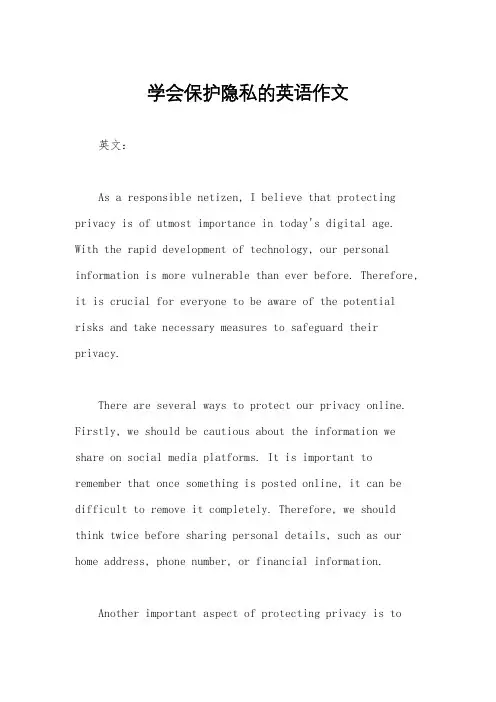
学会保护隐私的英语作文英文:As a responsible netizen, I believe that protecting privacy is of utmost importance in today's digital age. With the rapid development of technology, our personal information is more vulnerable than ever before. Therefore, it is crucial for everyone to be aware of the potential risks and take necessary measures to safeguard their privacy.There are several ways to protect our privacy online. Firstly, we should be cautious about the information we share on social media platforms. It is important to remember that once something is posted online, it can be difficult to remove it completely. Therefore, we should think twice before sharing personal details, such as our home address, phone number, or financial information.Another important aspect of protecting privacy is touse strong and unique passwords for all our online accounts. Using the same password for multiple accounts can make us more susceptible to hacking and identity theft. It is also advisable to enable two-factor authentication whenever possible to add an extra layer of security.Furthermore, being mindful of the websites we visit and the links we click on is essential for protecting our privacy. Phishing scams and malicious websites can easily compromise our personal information if we are not careful. Therefore, it is important to only visit reputable websites and avoid clicking on suspicious links or downloading unknown files.In addition, it is crucial to regularly update our privacy settings on social media and other online platforms. By doing so, we can control who has access to our personal information and minimize the risk of unauthorized access.Overall, protecting privacy is a continuous effort that requires awareness, caution, and proactive measures. By taking these steps, we can better protect our personalinformation and reduce the risk of privacy breaches.中文:作为一个负责任的网络公民,我相信在当今数字时代保护隐私至关重要。
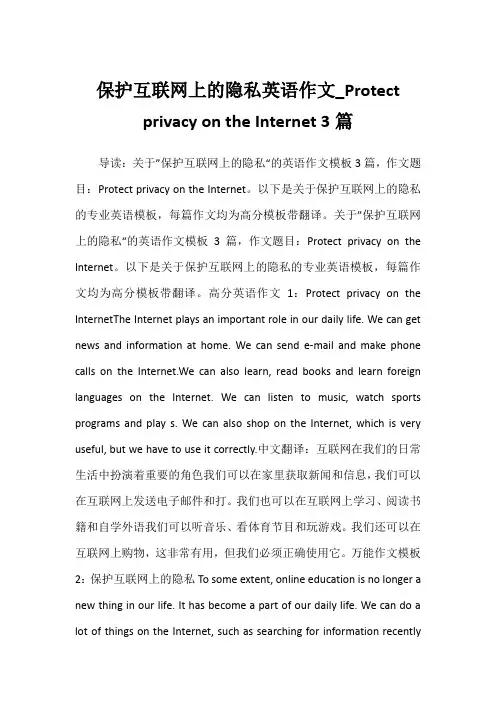
保护互联网上的隐私英语作文_Protectprivacy on the Internet 3篇导读:关于”保护互联网上的隐私“的英语作文模板3篇,作文题目:Protect privacy on the Internet。
以下是关于保护互联网上的隐私的专业英语模板,每篇作文均为高分模板带翻译。
关于”保护互联网上的隐私“的英语作文模板3篇,作文题目:Protect privacy on the Internet。
以下是关于保护互联网上的隐私的专业英语模板,每篇作文均为高分模板带翻译。
高分英语作文1:Protect privacy on the InternetThe Internet plays an important role in our daily life. We can get news and information at home. We can send e-mail and make phone calls on the Internet.We can also learn, read books and learn foreign languages on the Internet. We can listen to music, watch sports programs and play s. We can also shop on the Internet, which is very useful, but we have to use it correctly.中文翻译:互联网在我们的日常生活中扮演着重要的角色我们可以在家里获取新闻和信息,我们可以在互联网上发送电子邮件和打。
我们也可以在互联网上学习、阅读书籍和自学外语我们可以听音乐、看体育节目和玩游戏。
我们还可以在互联网上购物,这非常有用,但我们必须正确使用它。
万能作文模板2:保护互联网上的隐私To some extent, online education is no longer a new thing in our life. It has become a part of our daily life. We can do a lot of things on the Internet, such as searching for information recentlyand communicating with friends from work education has become a fashion. The popularity of online education is first of all because of its outstanding advantages. It breaks the barrier between time and space, People can easily study at home through the Internet at any time through the computer; secondly, people can no longer read those boring textbooks, but can enjoy colorful images, good sounds and charming videos, which will arouse his great interest in learning.However, the disadvantages of online education are obvious. Sometimes, due to the poor network connection, there is a lack of between students and teachers Enough interaction as the saying goes, every coin has two sides. Online education does not develop well, but also has limitations.I still believe that with the further development of the Internet, the future of online education will be better. Another network activity has become popular recently, that is online education. Why can online education be accepted by the public in such a short period of time One important reason is the rapid development of the Internet.Another deep-seated reason is the rapid development of today's society and science and technology. Modern science and technology are developing at a lightning speed. In order to catch up with this development, we all feel an urgent and strong desire to learn.In society, many people are too busy to learn in school. Online education just helps them. As far as I am concerned, I appreciate this new form of education.It is indeed a beneficialsupplement to the traditional means of education. It provides different learners with more flexible and diverse learning methods. Through online education, we can learn and absorb the latest knowledge while looking for a job.中文翻译:在某种程度上,在线不再是我们生活中的新鲜事物,它已经成为我们日常生活的一部分,我们可以在网上做很多事情,例如最近搜索信息和与远方的朋友交流,网络教育已成为一种时尚,网络教育的普及首先是因为它的突出优势,它打破了时间和空间之间的障碍,人们可以随时通过电脑上网在家里方便地学习;其次,人们不再阅读那些枯燥乏味的课本,而是可以欣赏到丰富多彩的图像,好的声音和迷人的视频,这会引起他对学习的极大兴趣然而,在线教育的缺点是显而易见的,有时由于网络连接不好,学生和老师之间缺乏足够的互动 正如俗话所说,每一枚硬币都有两面性在线教育确实发展不好,也有局限性我仍然相信随着互联网的进一步发展,网络教育的未来会更加美好,另一项网络活动最近流行起来,那就是网络教育,为什么在线教育能在这么短的时间内被公众接受,其中一个重要原因是互联网的快速发展,另一个深层次的原因是当今社会和科技的飞速发展,现代科学技术正以闪电般的速度发展着,为了赶上这一发展,我们都感到迫切而强烈的求学欲望社会上,很多人都忙得没时间在学校里学习在线教育只是帮了他们的忙。
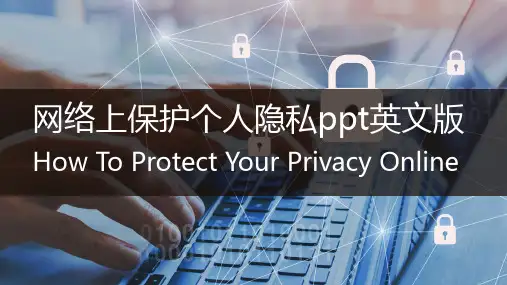
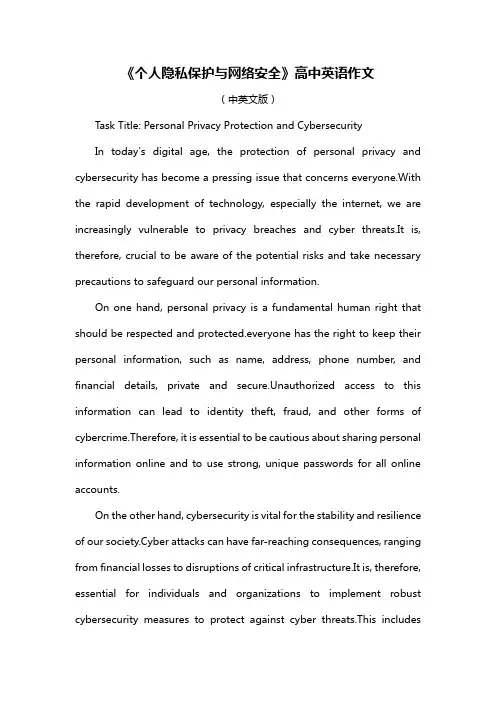
《个人隐私保护与网络安全》高中英语作文(中英文版)Task Title: Personal Privacy Protection and CybersecurityIn today's digital age, the protection of personal privacy and cybersecurity has become a pressing issue that concerns everyone.With the rapid development of technology, especially the internet, we are increasingly vulnerable to privacy breaches and cyber threats.It is, therefore, crucial to be aware of the potential risks and take necessary precautions to safeguard our personal information.On one hand, personal privacy is a fundamental human right that should be respected and protected.everyone has the right to keep their personal information, such as name, address, phone number, and financial details, private and secure.Unauthorized access to this information can lead to identity theft, fraud, and other forms of cybercrime.Therefore, it is essential to be cautious about sharing personal information online and to use strong, unique passwords for all online accounts.On the other hand, cybersecurity is vital for the stability and resilience of our society.Cyber attacks can have far-reaching consequences, ranging from financial losses to disruptions of critical infrastructure.It is, therefore, essential for individuals and organizations to implement robust cybersecurity measures to protect against cyber threats.This includesusing up-to-date antivirus software, regularly updating operating systems and applications, and being cautious about clicking on suspicious links or downloading attachments from unknown sources.In conclusion, the protection of personal privacy and cybersecurity is an issue that cannot be ignored.As individuals, we must take responsibility for our own online safety and privacy.This includes being cautious about sharing personal information online, using strong passwords, and implementing other security measures.Additionally, governments and organizations must also play their part by investing in cybersecurity technologies and enforcing regulations to protect individuals' privacy rights.Only through a combination of individual and collective efforts can we effectively protect our personal privacy and ensure a safe and secure digital future.。
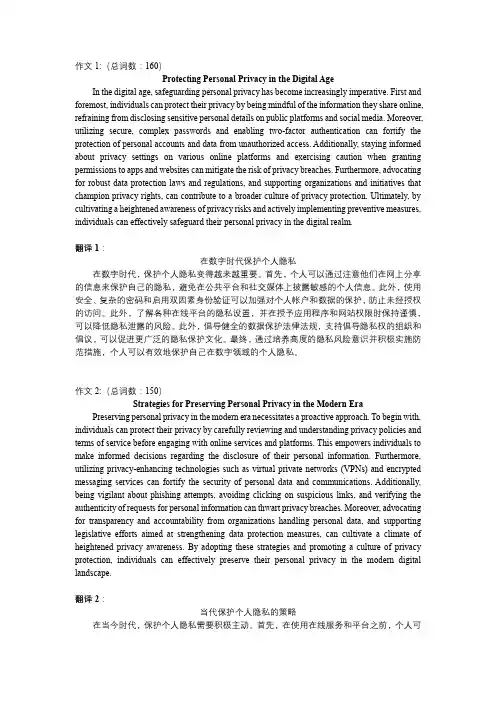
作文1:(总词数:160)Protecting Personal Privacy in the Digital AgeIn the digital age, safeguarding personal privacy has become increasingly imperative. First and foremost, individuals can protect their privacy by being mindful of the information they share online, refraining from disclosing sensitive personal details on public platforms and social media. Moreover, utilizing secure, complex passwords and enabling two-factor authentication can fortify the protection of personal accounts and data from unauthorized access. Additionally, staying informed about privacy settings on various online platforms and exercising caution when granting permissions to apps and websites can mitigate the risk of privacy breaches. Furthermore, advocating for robust data protection laws and regulations, and supporting organizations and initiatives that champion privacy rights, can contribute to a broader culture of privacy protection. Ultimately, by cultivating a heightened awareness of privacy risks and actively implementing preventive measures, individuals can effectively safeguard their personal privacy in the digital realm.翻译1:在数字时代保护个人隐私在数字时代,保护个人隐私变得越来越重要。
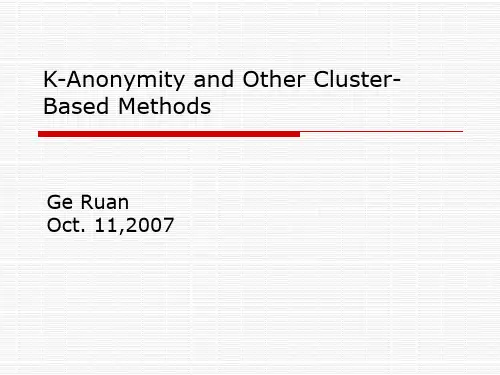
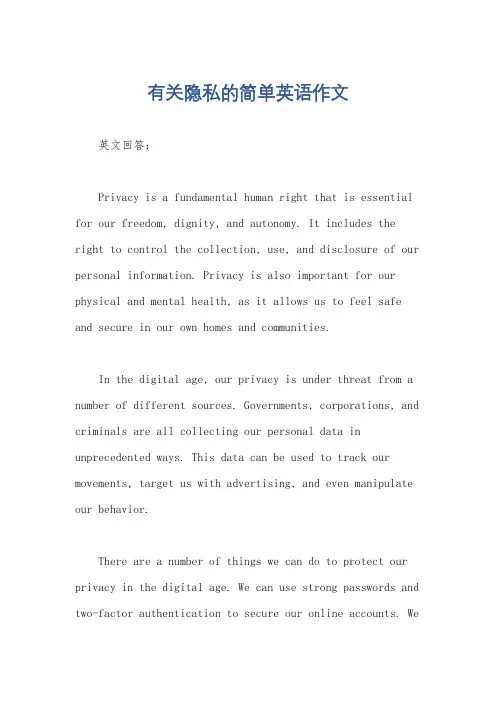
有关隐私的简单英语作文英文回答:Privacy is a fundamental human right that is essential for our freedom, dignity, and autonomy. It includes the right to control the collection, use, and disclosure of our personal information. Privacy is also important for our physical and mental health, as it allows us to feel safe and secure in our own homes and communities.In the digital age, our privacy is under threat from a number of different sources. Governments, corporations, and criminals are all collecting our personal data in unprecedented ways. This data can be used to track our movements, target us with advertising, and even manipulate our behavior.There are a number of things we can do to protect our privacy in the digital age. We can use strong passwords and two-factor authentication to secure our online accounts. Wecan be careful about what personal information we share online. And we can support organizations that are workingto protect our privacy rights.Privacy is a complex issue, but it is one that is essential for our freedom and well-being. By understanding our privacy rights and taking steps to protect them, we can help to ensure that we continue to live in a free and democratic society.中文回答:隐私权是一项基本人权,它对我们的自由、尊严和自主权至关重要。
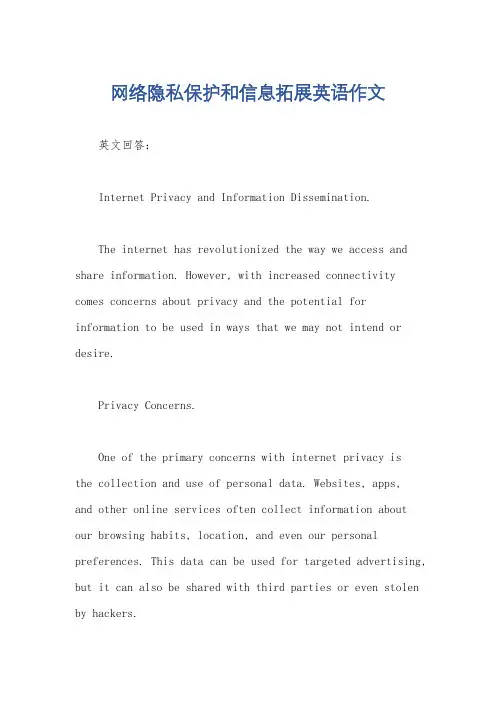
网络隐私保护和信息拓展英语作文英文回答:Internet Privacy and Information Dissemination.The internet has revolutionized the way we access and share information. However, with increased connectivity comes concerns about privacy and the potential for information to be used in ways that we may not intend or desire.Privacy Concerns.One of the primary concerns with internet privacy isthe collection and use of personal data. Websites, apps,and other online services often collect information about our browsing habits, location, and even our personal preferences. This data can be used for targeted advertising, but it can also be shared with third parties or even stolen by hackers.Information Dissemination.The internet has also made it easier for information to be disseminated on a global scale. This has led to increased access to information, but it has also created challenges in terms of verifying the accuracy andreliability of the information we encounter online.Balancing Privacy and Information.Balancing the need for privacy and the benefits of information dissemination is a complex issue. There is no easy solution, but there are several steps that can be taken to protect our privacy while still allowing for the free flow of information.Privacy Protections.There are a number of privacy protections that can be implemented to help protect our personal data. These include:Using strong passwords and security measures.Being cautious about sharing personal information online.Using privacy-focused browsers and search engines.Opting out of targeted advertising.Information Verification.Verifying the accuracy and reliability of information online is essential to avoid misinformation and disinformation. Some tips for verifying information include:Checking multiple sources.Looking for reliable and reputable sources.Being aware of biases and misinformation tactics.Using fact-checking websites.Conclusion.The internet has brought about tremendous benefits, but it is important to be aware of the privacy risks and challenges associated with information dissemination. By taking steps to protect our privacy and by verifying the accuracy of information, we can continue to enjoy the benefits of the internet while minimizing the risks.中文回答:网络隐私保护和信息拓展。
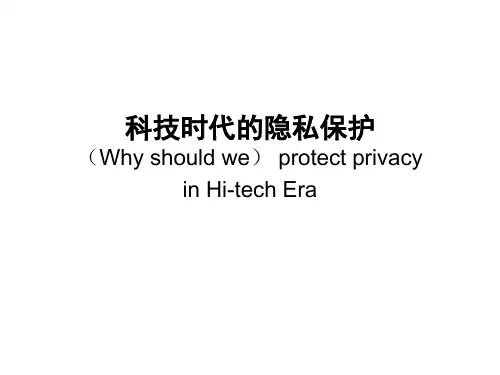
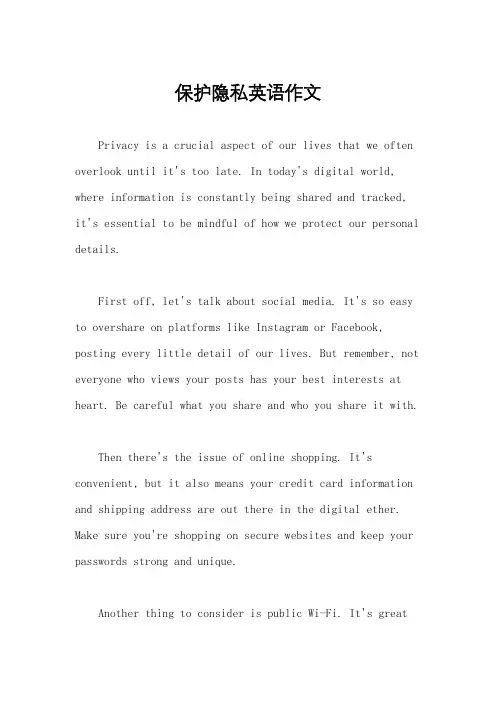
保护隐私英语作文Privacy is a crucial aspect of our lives that we often overlook until it's too late. In today's digital world, where information is constantly being shared and tracked,it's essential to be mindful of how we protect our personal details.First off, let's talk about social media. It's so easy to overshare on platforms like Instagram or Facebook, posting every little detail of our lives. But remember, not everyone who views your posts has your best interests at heart. Be careful what you share and who you share it with.Then there's the issue of online shopping. It's convenient, but it also means your credit card information and shipping address are out there in the digital ether. Make sure you're shopping on secure websites and keep your passwords strong and unique.Another thing to consider is public Wi-Fi. It's greatwhen you're out and about and need to check your emails or browse the web, but it's also a prime target for hackers. Avoid doing anything sensitive like online banking or shopping when connected to public Wi-Fi.And let's not forget about our phones. They hold so much personal information – photos, contacts, messages, and more. Make sure your phone is password-protected and consider using additional security measures like two-factor authentication.In conclusion, protecting our privacy is aresponsibility we all have to take seriously. It's not just about keeping our information safe from hackers or strangers; it's about maintaining our dignity and control over our lives. So be smart, be careful, and don't forget to lock up your digital doors.。
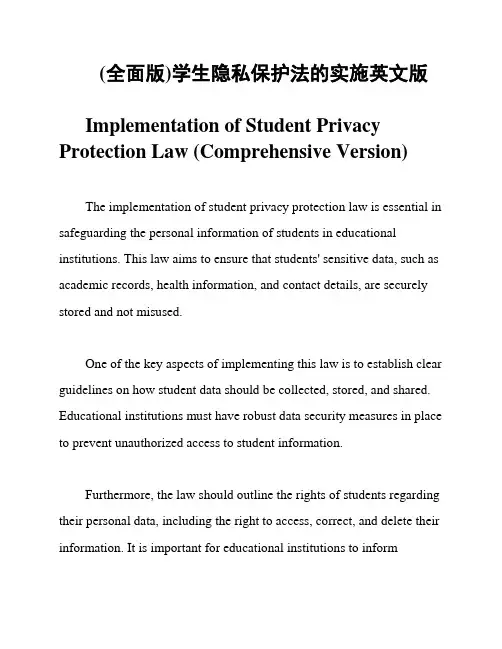
(全面版)学生隐私保护法的实施英文版Implementation of Student Privacy Protection Law (Comprehensive Version) The implementation of student privacy protection law is essential in safeguarding the personal information of students in educational institutions. This law aims to ensure that students' sensitive data, such as academic records, health information, and contact details, are securely stored and not misused.One of the key aspects of implementing this law is to establish clear guidelines on how student data should be collected, stored, and shared. Educational institutions must have robust data security measures in place to prevent unauthorized access to student information.Furthermore, the law should outline the rights of students regarding their personal data, including the right to access, correct, and delete their information. It is important for educational institutions to informstudents about their privacy rights and obtain their consent before collecting any data.In addition, the implementation of the student privacy protection law should involve regular audits and assessments to ensure compliance with the regulations. Educational institutions should appoint a data protection officer to oversee data security practices and handle any privacy-related issues.Overall, the successful implementation of the student privacy protection law requires collaboration between educational institutions, government agencies, and other stakeholders. By prioritizing the privacy and security of student data, we can create a safe and trusted environment for learning and development.。
隐私泄漏与隐私保护看图英语作文The digital age has brought with it unprecedented levels of connectivity and convenience, but it has also raised significant concerns about privacy. As our lives become increasingly intertwined with technology, the risk of personal information being compromised or misused has grown exponentially. Privacy leaks, whether through data breaches, social media oversharing, or government surveillance, have become a significant threat to individuals and society as a whole.One of the most high-profile examples of privacy leaks in recent years was the Facebook-Cambridge Analytica scandal. In 2018, it was revealed that the political consulting firm Cambridge Analytica had improperly accessed the personal data of millions of Facebook users without their consent. This data was then used to create targeted political advertisements and influence the 2016 US presidential election. The incident sparked a global outcry and led to increased scrutiny of social media companies and their data-handling practices.Another major privacy concern is the proliferation of smart devicesand the Internet of Things (IoT). As our homes, cars, and even our bodies become connected to the internet, the amount of personal data being collected and stored by technology companies has skyrocketed. From voice recordings and location data to personal health information, this trove of sensitive data is a tempting target for hackers and data brokers alike.The risks of privacy leaks extend beyond the individual level. Government surveillance programs, such as the NSA's PRISM program revealed by whistleblower Edward Snowden, have raised concerns about the erosion of civil liberties and the potential for abuse of power. In an age of increasing digitalization, the line between national security and personal privacy has become increasingly blurred, leaving citizens to grapple with the trade-offs between security and privacy.In response to these privacy concerns, there has been a growing push for stronger privacy protections and regulations. The European Union's General Data Protection Regulation (GDPR), which came into effect in 2018, has set a new global standard for data privacy, with strict requirements for how companies handle and protect personal information. Similarly, the California Consumer Privacy Act (CCPA), which went into effect in 2020, has given residents of the state more control over their personal data.However, the implementation and enforcement of these privacy laws have not been without their challenges. Tech companies have resisted some of the more stringent requirements, arguing that they stifle innovation and create unnecessary burdens. Furthermore, the rapid pace of technological change has made it difficult for policymakers to keep up, leaving many gaps in the legal framework.At the individual level, there are also steps that can be taken to protect one's privacy. Using strong and unique passwords, enabling two-factor authentication, and being cautious about the personal information shared on social media are all important measures. Additionally, individuals can utilize privacy-focused tools and services, such as encrypted messaging apps and virtual private networks (VPNs), to shield their online activities from prying eyes.Ultimately, the issue of privacy leaks and privacy protection is a complex and multifaceted challenge that requires a coordinated effort from individuals, businesses, and governments. As our reliance on technology continues to grow, it is crucial that we find a balance between the benefits of technological progress and the fundamental human right to privacy. Only through a combination of robust legal frameworks, responsible corporate practices, and individual vigilance can we hope to safeguard our privacy in the digital age.。
保护互联网的隐私英语作文English: With the rapid advancement of technology, the issue of protecting online privacy has become increasingly important. In order to safeguard internet users' personal information, it is essential for both individuals and organizations to take proactive measures. Individuals should be cautious about sharing personal data online, such as avoiding clicking on suspicious links or disclosing sensitive information on social media platforms. They should also regularly update their privacy settings and use secure passwords to prevent unauthorized access to their accounts. On the other hand, organizations should prioritize data security by implementing encryption techniques, conducting regular security audits, and complying with data protection regulations. Additionally, governments and regulatory bodies play a crucial role in safeguarding online privacy by enforcing strict laws and regulations to hold entities accountable for any data breaches or privacy violations. Overall, protecting internet privacy requires a collective effort from all stakeholders to create a safe and trustworthy online environment.Translated content: 随着技术的迅猛发展,保护网络隐私的问题变得日益重要。
电脑隐私英文作文英文:Privacy is a very important issue when it comes to using a computer. With the increasing use of technology, it has become easier for hackers and other individuals to access our personal information. Therefore, it is important for us to take measures to protect our privacy.One of the most important things we can do is to use strong passwords. A strong password should be at least 8 characters long and include a combination of letters, numbers, and symbols. It is also important to use different passwords for different accounts. This way, if one account is hacked, the others will still be safe.Another way to protect our privacy is to use a virtual private network (VPN). A VPN encrypts our internet traffic and hides our IP address, making it more difficult for others to track our online activities. This is especiallyimportant when using public Wi-Fi networks, which are often unsecured.We should also be careful about what we share online. This includes not only personal information such as our name and address, but also things like our location and photos. We should be aware of our privacy settings onsocial media platforms and adjust them accordingly.In addition, we should be cautious about downloading and installing software from unknown sources. Malware and other malicious programs can be hidden in these downloads, which can compromise our privacy and security.Overall, it is important to be proactive about protecting our privacy when using a computer. By using strong passwords, a VPN, and being cautious about what we share online, we can help to ensure that our personal information remains safe.中文:在使用电脑时,隐私是一个非常重要的问题。
homeprivacy policytoscontacttoolsessaywriter -回复第一步:理解主题和关键词在开始回答问题之前,让我们先理解一下主题和关键词的含义。
主题:主题是指要探讨的核心内容或议题。
在这个问题中,主题是“[homeprivacy policytoscontacttoolsessay writer]”,即家庭隐私政策、条件和联系工具,以及论文写作服务。
关键词:1. 家庭隐私政策(home privacy policy):指的是家庭关于个人隐私保护的政策和规定。
2. 条件(tos):是一个英文缩写,表示服务条款(Terms of Service),是指人们在使用一个服务时需遵守的条件和规则。
3. 联系工具(contact tools):指用于联络的工具或方法,可以是电话、邮件、社交媒体等。
4. 论文写作服务(essay writer):指提供论文撰写和编辑服务的专业机构或个人。
现在,我们可以逐步回答这个问题了。
第二步:家庭隐私政策(Home Privacy Policy)一个家庭隐私政策是一种保护家庭成员个人隐私的政策和规定。
随着科技的进步,我们越来越依赖智能设备和互联网,这意味着我们的私人信息更容易受到侵犯。
为了确保家庭成员的隐私得到保护,一个家庭隐私政策可以包括以下内容:1. 家庭成员数据的收集和使用:- 定义哪些信息被认为是个人隐私信息,如姓名、生日、家庭住址等。
- 规定个人信息的收集方式,例如通过智能设备、电话或其他方式。
- 列举可能收集个人信息的场景,如家庭聚会、在线购物等。
2. 个人隐私信息的保护:- 描述如何储存个人隐私信息,如使用加密技术或安全密码保护。
- 规定只有在获得家庭成员的同意或遵守法律要求的情况下才能分享个人信息。
- 制定措施防止个人信息泄露、滥用或被未授权的人访问。
3. 家庭成员权利和责任:- 解释家庭成员可以享有的隐私权利,如访问自己的个人数据、更正错误的信息等。
Paul Gewirtz:《Privacy and Speech》》n the Supreme Court Review (2001), p139 -199葛维宝:《隐私与言论》最高法院评论An drew Beale :《Esse ntial Con stituti onal Law » (Second Editi on) Wu Han Uni versity Press , p84 -85安德鲁.比尔《宪法论》Jon atha n Rose noer :《Cyber Law —The Law of The In ternet》China University of Politics Scienee and Law Press 约纳森.罗萨诺《网络法- 关于因特网的法律》S . Warren & L . Brandeis , The Right of Privacy , 4 Harvard . L .Reriew .193 (1890 )隐私权哈佛大学评论Dr. Thomas Hart ; Graham Sutton《Personal Data Protection》Law Press 托马斯.哈特博士;格雷汉姆.萨顿《个人数据保护》法律出版社We ofte n disclose ourselves to the world at large, or at least we act as if indifferent to the world's eyes. But at other times, most of us try to con trol the disclosure of certa in matters about ourselves. Sometimes we share thoughts, feelings, information, personality, or bodily appearanee with no one at all . More commonly , we share these things with a limited number of other people . Privacy in this sense -the ability to control and to avoid the disclosure of certa in matters about on eself - is a widely recognized value, an important precondition for human flourishing.I、The Development and Lawmaking of the Right to PrivacyAs a type of legal right , the incipiency of the Right to Privacy may be th tracked back to the 19th Century . In 1890 , Samuel Warren and Louis Brandeis firstly used the concept of the Right to Privacy . The United State thereafter gradually established the legal position of the Right to XI. Privacy . In the middle 20th Century , the “United Declaration of Human Right ”“, the International Covenant on Civil and Political Rights”and the other international human rights documentaries acknowledged the status of a basic human right of the right to privacy .Thus ,the right to privacy became a topic that specially concerned and widely argued by jurisconsults all over the world . So, the Right of Privacy is not a new concept . Since the right for privacy was defined for the first time well over 100 years ago , not much has changed on a fundamental level .The start of focus on and discussion of the right to privacyin China is later than other countries ,so there are still many points , either in theory or in practice , urgently need to be clarified .我们经常现身于大庭广众之中,在此类场合下,我们通常不介意世人的窥视;但在其他时候,我们中大多数人都会尽力不让某些私事过于张扬。
个人保护领域术语
1. 个人隐私保护(Personal privacy protection)- 确保个人的个人信息和隐私受到适当的保护,以防止未经授权的访问、使用或披露。
2. 数据保护(Data protection)- 保护个人信息和敏感数据免受未经授权的访问、丢失、破坏或泄露。
3. 身份认证(Identity authentication)- 确定用户的身份,通常通过使用密码、生物识别技术或其他安全措施来验证用户。
4. 安全漏洞(Security vulnerability)- 指软件、系统或网络中存在的可能被黑客利用的弱点或缺陷。
5. 双因素认证(Two-factor authentication)- 使用两个或多个不同类型的身份验证方式来确认用户的身份,提高账户安全性。
6. 数据加密(Data encryption)- 通过使用加密算法将敏感数据转换为不可读的格式,以保护数据的机密性和完整性。
7. 权限管理(Access control)- 限制和授权特定用户或角色对系统、应用程序或数据的访问和操作权限。
8. 数据备份(Data backup)- 定期复制和存储数据的副本,以便在数据丢失、损坏或灾难发生时进行恢复。
9. 恶意软件(Malware)- 指计算机病毒、蠕虫、木马等恶意软件,可能会对系统进行损害、信息窃取或其他不良活动。
10. 追踪保护(Tracking protection)- 技术工具或设置,限制域内或跨域的跟踪活动,以保护用户的隐私和浏览活动。